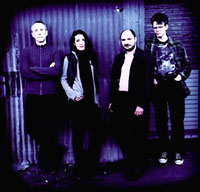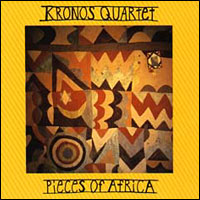|
Concert Review by Lou Wigdor In the Orbit of Kronos |
 The
Kronos Quartet* began its October 25 concert at the UMass
Fine Arts Center with Yugoslav-born composer Aleksandra Vrebalov’s Pannonia
Boundless-- a sonic portal into an evening of diverse musical
offerings across time, space, and cultures. “Pannonia,” observes
its composer, “is a completely open and wide land of many crossroads
that connect the Mediterranean with Northeast Europe and the Orient.
It has a special limitless space.” That’s to say that lots of
cultures and political power houses have made their presence felt in
Pannonia, which was once a Roman province and then fell under the
clutches of the Holy Roman Empire, the Ottomans, Hapsburgs, and
Soviets. (At the turn of this century, its redrawn boundaries embraced
parts of Austria, Croatia, Slovenia, and Hungary.) As the Kronos
struck up the band and Pannonia Boundless unfolded, upwellings
of plaintive and then propulsive Gypsy-inspired motifs alternated,
evoking the ebb and flow of peoples and cultures across the Pannonian
tableau. The
Kronos Quartet* began its October 25 concert at the UMass
Fine Arts Center with Yugoslav-born composer Aleksandra Vrebalov’s Pannonia
Boundless-- a sonic portal into an evening of diverse musical
offerings across time, space, and cultures. “Pannonia,” observes
its composer, “is a completely open and wide land of many crossroads
that connect the Mediterranean with Northeast Europe and the Orient.
It has a special limitless space.” That’s to say that lots of
cultures and political power houses have made their presence felt in
Pannonia, which was once a Roman province and then fell under the
clutches of the Holy Roman Empire, the Ottomans, Hapsburgs, and
Soviets. (At the turn of this century, its redrawn boundaries embraced
parts of Austria, Croatia, Slovenia, and Hungary.) As the Kronos
struck up the band and Pannonia Boundless unfolded, upwellings
of plaintive and then propulsive Gypsy-inspired motifs alternated,
evoking the ebb and flow of peoples and cultures across the Pannonian
tableau.
That was the opener in a boundary-scrambling evening that featured eight subsequent excursions by composers from Mexico, Germany, Azerbaijan, the United States, Estonia and India. Playing with organic mastery, the quartet chased Pannonia with a small but rhythmically potent nativistic masterpiece by Silvestre Revueltas that suggested a Mexican gloss on Stravinsky and Bartok. Later in the program, there were deeply contemplative pieces by the Estonian, Arvo Part, and the 12th century German abbess, Hildegard von Bingen. In marked contrast, American composer Michael Gordon’s Potassium employed ostinato,** punctuated by abrupt tempo changes, quirky updrafts of portamenti,*** and arced outbursts suggesting an affinity with electric guitar and synthesizer effects. The opus on the program most likely to be heard by our great grandchildren was Steven Reich’s Triple Quartet, a continually absorbing, often exciting, minimalist sandwich of two propulsive movements enclosing a lyrical one exuding shades of a Jewish niggun. Throughout the piece, the Kronos conversed contrapuntally with two quartets of similar stature and proclivities-(i.e., the Kronos played with themselves and themselves via prerecorded tape.) Was it inspiring for Kronos to respond musically to Kronos clones on tape? “We were playing so fast and with so little leeway, that I was happy just to hit all the notes,” confessed Kronos cellist Jennifer Culp after the concert. “Listening to us [Kronos #2 and Kronos#3] on the tape, it occurred to me that I sure play better today than when I recorded the piece,” added first violinist David Harrington. To my ears, two offerings on the
program were less successful than the others. Charles Mingus’ Myself
When I Was Real frequently meandered, offering this listener But risk taking that occasionally leaves listeners like me at arms length is part of an essential Kronos process that listeners like me wouldn’t have any other way. No risk; no gain--and no boundary-stretching, boundary-spanning innovativeness where traditional musical categories approach some sort of universal synthesis. “The music that I find the most interesting doesn’t fit traditional categories. If a composition or genre becomes too predictable or too easily labeled, I get nervous,” Kronos artistic director and first violinist David Harrington told this reviewer. After twenty-eight years of letting it all hang out, Harrington and the Kronos find themselves in a curious position: composers come to them in droves. What could be more aesthetically or career enhancing to an aspiring composer than a Kronos commission or performance? With 450+ commissioned works under the quartet’s belt, it’s almost as if the Kronos has foundation status in the classical music world. But that doesn’t stop the Kronos, especially Harrington, from hunting and gathering for the music themselves. Harrington is a voracious consumer of concerts and cds. Wherever the Kronos goes, he hits the record shops in force and, when time permits, seeks out the local music scene. (That’s a mind-boggling prospect considering the quartet’s peripatetic ways: Kronos gives seventy-five recitals a year; its itinerary since last April has included appearances in Paris, Athens, Skopje (Macedonia), Baltimore, Berkeley, Beirut, Tokyo, Yokohama, Riga, Halifax, and other ports of call. With much of the planet as its venue, discoveries do happen. Harrington recalls a recent visit to Seattle: “I was at a performance installation by the artist/inventor Trimpin that involved a number of toy player pianos, each which featured music by a different composer. I put a quarter in one of the pianos, and out came fascinating music by a young woman from Colombia. I’ve since contacted her, and listened to more of her work. She is currently writing a piece for us.” The Kronos has played and
commissioned works by many composers from cultures with strong
improvisational musical traditions. Has the quartet itself embraced
improvisation? “That’s a project for my next life,” responded
Jennifer Culp. Harrington With all the rage about Kronos’ crossing traditional musical boundaries, it’s easy to lose sight of another of the quartet’s boundary-spanning tenets-interacting early and often with their audiences. Unlike most chamber music practitioners, the Kronos, via Harrington, announces and gives brief asides about most compositions on a program. During their stay in Amherst, the Kronos remained on stage after their concert to field questions, discuss musical issues, and just plain get to know and learn from their audience. The next day, in a seminar at UMass for music educators and the general public, the quartet discussed their efforts to integrate world music with classical music. And several hours before that, the quartet filled the Fine Arts Center with school children to lead them in playing musical instruments that they had constructed from kits. Little wonder that the multigenerational audiences at Kronos concerts contrast vividly with the typical demographics at most classical music recitals. Several years ago when I was still in my forties, I felt distinctly a part of the younger generations at most classical concerts. In contrast, the generations are as eclectic as the music when Kronos comes to town-with Xers, Boomers, and their elders all making the same scene. “From the look of our audiences, it seems like people in their early twenties are hearing about our music. If we’re doing our job, they and the older generations should all be coming out to our concerts,” Harrington told this writer. “You’ve been my favorite group since I saw you on Sesame Street as a five-year-old,” confessed a college student at the question-and-answer session after the concert. “I remember that,” mused Harrington. “It was exhilarating standing next to Big Bird. Does anyone here remember what we were wearing? I think it was something outrageous.” |
| * The Kronos Quartet members are David Harrington, violin; John Sherba, violin; Hank Dutt, viola; and Jennifer Culp, cello. ** ostinato - The continuous repetition of a theme with a varying contrapuntal accompaniment. *** portamenti - Smooth gliding among tones with emphasized sounding of the medium tones. |
 insufficient emotional and intellectual payoff. And Azerbaijani
composer Franghiz Ali-Zadeh’s Oasis, despite its title and
piped in loops of synthesized gurgling water, exuded a degree of
academic aridity that seemed-at least superficially-distinctly unKronos.
insufficient emotional and intellectual payoff. And Azerbaijani
composer Franghiz Ali-Zadeh’s Oasis, despite its title and
piped in loops of synthesized gurgling water, exuded a degree of
academic aridity that seemed-at least superficially-distinctly unKronos. concurs: “We’ve been on the receiving
end of developments in notation that allow for greater flexibility,
including some improvisation. Lutoslawski wrote a quartet for us that
allows for greater freedom among the musicians. But improvisation is
not central to our own training and background, which is very
different from the classical traditions of Asian masters like Iranian
Kayhan Kalhor, who wrote a piece for us and him that’s on our Caravan
disc. Kayhan and other Asian masters have years of rigorous
classical training in improvisation. (They also, he noted, are far
more accomplished in controlling intonation.) We could never hope to
improvise on their level. What we can do is encourage each
composer to write his or her greatest piece for us; work with the
composer to get it right; and bring our maximum conviction and
spontaneity to the performance.”
concurs: “We’ve been on the receiving
end of developments in notation that allow for greater flexibility,
including some improvisation. Lutoslawski wrote a quartet for us that
allows for greater freedom among the musicians. But improvisation is
not central to our own training and background, which is very
different from the classical traditions of Asian masters like Iranian
Kayhan Kalhor, who wrote a piece for us and him that’s on our Caravan
disc. Kayhan and other Asian masters have years of rigorous
classical training in improvisation. (They also, he noted, are far
more accomplished in controlling intonation.) We could never hope to
improvise on their level. What we can do is encourage each
composer to write his or her greatest piece for us; work with the
composer to get it right; and bring our maximum conviction and
spontaneity to the performance.”